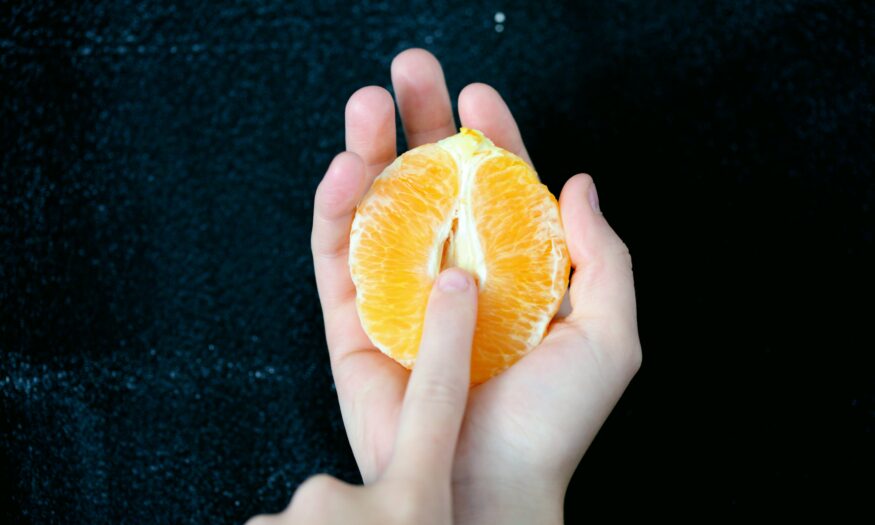Douches
 Illustration by Carmen M. Mota from Pussypedia
Illustration by Carmen M. Mota from Pussypedia
The following text uses the word “pussy*” as defined by Pussypedia.
by Hannah Silver
What’s Going On?
Like the Grand Canyon and the Great Barrier Reef, vaginas are a great natural wonder that thrive wonderfully on their own. They are a self-cleaning marvel. The vagina possesses lots of bacteria, mostly Lactobacilli, which create an acidic environment that protects against germs and STIs.1 The bacteria living in your vagina is called your “vaginal microbiome.” Vaginas also clean themselves by creating mucus that wash out whatever shouldn’t be there, leaving us with a nice surprise in our underwear.2
Even with these impressive qualities, vaginas are thought of as dirty and stinky when they are, in fact, clean. Vaginas have a natural odor. “Physical activity can produce a stronger scent, but that’s still normal.”2
If you’re concerned about a new or different smell or a change in discharge, seek medical attention and not the vaginal turkey baster of doom.
Some people with pussies* attempt to unnecessarily clean or alter the smell of their vaginas by douching. A douche is made up of a nozzle attached to a plastic container or bag, filled with a mixture of water and vinegar, baking soda, or iodine. The nozzle is inserted into the vagina where it squirts out the contents of the bag.2
Douche products like Summer’s Eve promise to make your pussy* smell “fresh,” “floral,” “tropical” or even “caring,” and “light.”3 But really, they only temporarily mask the natural and expected odor of the vagina and risk disturbing your vagina’s ecosystem which can cause it not only to actually smell bad, but also a host of additional health problems.2
Douches disturb the vaginal microbiome by lowering the population of Lactobacilli bacteria.4 That raises pH levels, making the vagina less acidic and more prone to infections that cause pain and unpleasant odors.5 For example, bacterial vaginosis, an infection in the vagina that “sometimes causing a fishy odor, vaginal irritation, burning with urination, and a thin whitish-gray discharge”6 is statistically linked to douching.7 Douches are also linked to vaginal irritation and dryness.2
When the vaginal microbiome is weakened—like what happens with douches—it is easier to contract STIs including HIV,”2 and problems during pregnancy like “miscarriages, premature delivery, ectopic pregnancy and cervical cancer.”4
Using a douche for a “fresh and clean” vagina is a douchey thing to do to your vagina and your body. Douches perpetuate the idea that our vaginas’ are dirty and that their natural smell is not OK and that it must be masked. So people with pussies* are using douches to try to “clean” their pussies* and change their smells even though douches make them more vulnerable to bacterial infections that rob them of their health and make their pussies* smell worse.
How Common is This?
“Almost one in four American women ranging from 15 to 44 years old” douche.2
What Can I do to Take Care of my Pussy*?
Douches do not make your vagina “fresh.” They hurt it. The vagina cleans itself—you should not try to clean it. Don’t even try to clean it with soap. No soap up the crack! It irritates and, like douches, can mess up your microbiome.6 If you’re concerned about a new or different smell or a change in discharge, seek medical attention and not the vaginal turkey baster of doom.
To learn best practices for clean pussies*, read Pussypedia’s How to Wash It article.
Author’s Dedication: Shout out to breaking pussy* misconceptions!
Sources
- Miller Elizabeth A., Beasley Anna E., Dunn Robert R., Archie Elizabeth A. “Lactobacilli Dominance and Vaginal pH: Why Is the Human Vaginal Microbiome Unique?” Frontiers in Microbiology. 7. (2016): 1936. <https://www.ncbi.nlm.nih.gov/pmc/articles/PMC5143676/>.
- Office on Office on Women’s Health, U.S. Department of Health and Human Services. “Douching.” Accessed 10/3/23 at <https://www.womenshealth.gov/a-z-topics/douching>.
- <http://www.summerseve.com/feminine-hygiene-products>
- Asian E, Bechelaghem N. “To ‘douche’ or not to ‘douche’: hygiene habits may have detrimental effects on vaginal microbiota.” J Obstet Gynaecol. 38(5). (2018): 678-681. <https://www.ncbi.nlm.nih.gov/pubmed/29433363>.
- Von Glehn MP, Sidon LU, Machado ER. “Gynecological complaints and their associated factors among women in a family health-care clinic.” J Family Med Prim Care. 6(1). (2017): 88-92. <https://www.ncbi.nlm.nih.gov/pubmed/29026756>.
- Cornell Health. “Maintaining Vaginal Health.” Accessed 2019: <https://health.cornell.edu/sites/health/files/pdf-library/Maintaining-Vaginal-Health.pdf>.
- Ranjit E, Raghubanshi BR, Maskey S, Parajul P. “Prevalence of Bacterial Vaginosis and Its Association with Risk Factors among Nonpregnant Women: A Hospital Based Study.” International Journal of Medical Microbiology. 5 (2018): 8349601. <https://www.ncbi.nlm.nih.gov/pubmed/29692813>.
This article was previously published in Pussypedia and is reposted with permission.






